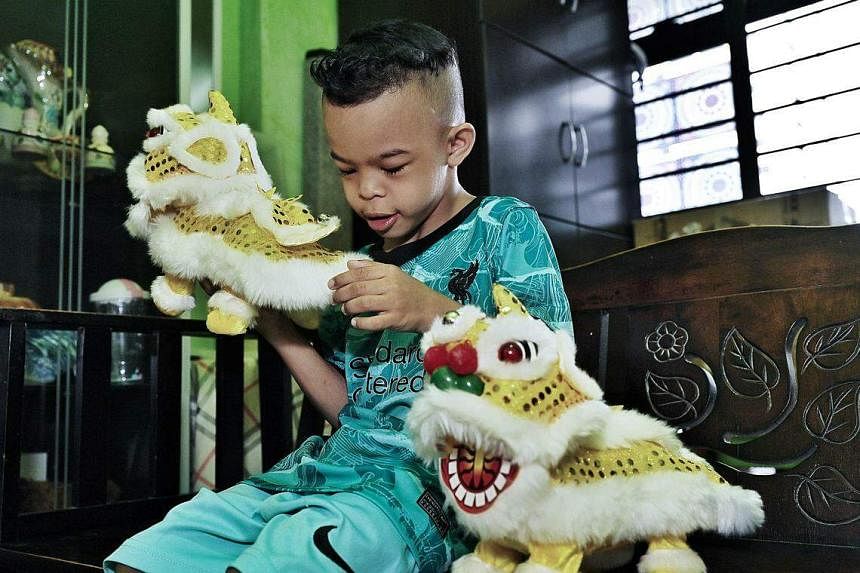'I had to be strong for him': Woman finds out son has rare genetic disorder after getting pregnant though IVF


SINGAPORE – After waiting five years to conceive, and grieving over a miscarriage, Ms Noraini Abdul Majid, 35, and her husband Mohamed Kamal Ibrahim, 50, never thought they would have to face yet another challenge: having to care for their child who was born with a rare genetic disorder.
Seven-year-old Mohamed Syakir Nasruddinq is one of some 30 people in Singapore diagnosed with Williams syndrome, a condition that affects cognitive development.
Ms Noraini and her husband had been trying for a baby since they got married in 2010, but later found out she had reproductive issues.
The option of conceiving through in-vitro fertilisation (IVF) was offered to the couple. They underwent the procedure in 2015 and a few months later, said prayers of gratitude when Ms Noraini found out she was pregnant.
Nurses at the couple’s gynaecology clinic told the housewife to come in for a blood test to check if she was pregnant, but Ms Noraini was so excited that she had already gone through boxes of pharmacy pregnancy test kits every day at home.
She said: “I was already sure I was pregnant, and I couldn’t be happier. I was practically skipping on my way to the clinic.”
What came as a surprise for the couple was when the doctor detected two heartbeats in Ms Noraini’s womb during one of her scans.
“I wanted to jump for joy. I waited so long to have a child of my own and now we were blessed with two. I was so grateful that everything was going well.”
Unfortunately, one of the foetuses died through miscarriage in the ninth week.
“I was devastated, but I wanted to be grateful for the baby I was still carrying. I told myself I would be the best mother.”
When Syakir was born in July 2016, Ms Noraini was thrilled to start her journey as a mother.
But her happiness was short-lived when, at a few weeks old, Syakir started to reject feeding attempts and cried for hours.
His weight plummeted from not eating, and the worried parents took him to the hospital.
After a five-day stay in hospital, Syakir started drinking milk again, but doctors felt that something was still wrong.
Blood test results concluded that Syakir had Williams syndrome, a rare and sporadic genetic disorder.
Ms Noraini said: “The room was spinning and I started to cry. I couldn’t believe it. I already suffered so much just getting pregnant. Why was this happening?”
She added: “I pulled myself together, and said that I had to be strong for him. If he has to go through something like this, how will I help him if I am busy crying? I needed to overcome my emotions and be someone he can depend on.”
At seven months of age, Syakir was enrolled in the Asian Women’s Welfare Association (Awwa) School in Hougang on the advice of doctors.
Ms Noraini continued taking him to the early intervention school three times a week until he turned six.
“It was hard. I was in constant contact with my social worker, who provided a listening ear for me. He told me that feeling tired didn’t mean I was a bad mother.”

Dr Vijayendra Ranjan Baral, a senior consultant at the Singapore General Hospital’s Department of Neonatal and Developmental Medicine, said there are about 30 patients with Williams syndrome in Singapore.
The incidence rate reported in medical literature is approximately one per 20,000 births.
He said that 80 per cent of those with the syndrome have cardiovascular problems, and half have endocrine and bone disorders. They also experience muscle and joint problems, and delay in growth, development and intellectual milestones.
Most children with Williams syndrome experience neurodevelopmental problems such as speech and language delay, learning and intellectual disabilities.
They also have delayed adaptive skills like feeding and going to the toilet.
“(Such) children may be slower at interacting and playing with their peers but are known to be quite friendly, social and eager to please,” said Dr Baral.
“Most adults with Williams syndrome have productive lives, but often require attention at home and work.
“They may work in supervised employment with appropriate support. Individuals are able to perform simple, focused work with clear instructions.”
When Syakir was six, doctors told Ms Noraini that his mental age was four.
She said: “I know of some parents of children with disabilities who enrol their children in normal-stream schools to help them grow.
“But I was so worried about what would happen to Syakir if I tried sending him to a normal school. What if the other kids can’t understand that he’s different?
“What if he gets bullied but can’t tell us what happened?”
Ms Noraini said she gets self-conscious whenever other parents or passers-by give her looks, especially when Syakir throws tantrums in public.
“I feel like they all think I’m a bad parent. They don’t know that he’s not like other kids.
“I hope that people have more compassion when they see kids like Syakir in public. Sometimes, disability is invisible.”
This article was first published in The Straits Times. Permission required for reproduction.